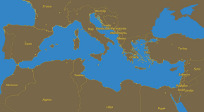Objectives
The POSOW I & II projects aims at establishing a regional cooperation synergy through the enhancement of knowledge and capacities of operators (professionals and volunteers) in the field of marine pollution, in European coastal countries of the Mediterranean Sea, namely Croatia, Cyprus, France, Greece, Italy, Malta, Slovenia and Spain, as well as in Southern Mediterranean European Neighbourhood Policy Countries and Enlargement Countries, namely Algeria, Egypt, Lebanon, Libya, Morocco, Tunisia and Turkey.
The project is in line with the main objectives of the European Commission in the field of Civil Protection. Thus POSOW projects’ activities aim at:
Improving the effectiveness of emergency response by enhancing the preparedness and awareness of civil protection professionals and volunteers.
Training trainers of the civil protection, professionals of local authorities and NGOs will:
- provide trainees with the required knowledge to undertake efficient and safe oiled shoreline assessment, shoreline cleanup operation and wildlife response operations;
- ensure that knowledge is disseminated to a large number of potential responders prior to an incident or at the initial stage of a response;
- support the management of volunteers which can rapidly become a burden if their integration is not planned in advance.
Supporting and complementing the efforts of the participating States for the protection of citizens, environment and property in the event of natural and man-made disasters.
Response at sea requires heavy, expensive and professionally driven resources, whilst recovery onshore requires organization, manpower, and light equipment. Some of the participating States have made considerable efforts and invested in at-sea response resources. This project supplements these resources to minimize the long term impact of a spill to the environment and European citizens in a safe context.
Facilitating reinforced cooperation between the participating countries in preparedness for civil protection and marine pollution.
Common approaches on shoreline assessment, cleanup operations, wildlife response and volunteer coordination procedures should facilitate cooperation and speed up communication in time of crisis. Following incidents, exchange of experience and lessons learnt amongst the participating countries would contribute to maintaining the level of preparedness to the highest standards.


